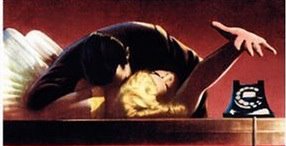Moustache Rides
Ok, Dial M For Murder was fabulous in the 3-D, Matt's right about the very subtle use Hitchcock makes of the form, with the layered spaces and all, but I'm sure it plays just as well without it. The self-reflexive wit, Grace Kelly's face, and the Inspector's moustache would all survive the transition quite well, I think. And that's all I want out of it.
More importantly, strolling along outside after the film, we saw the star of "The War At Home", and my personal favorite, Deep Blue Sea (seriously), strolling down the street with his family. That's right, Michael Rapaport was soaking in the New York holiday spirit, and we got to inhale the fumes together, for a brief moment of celeb-civilian fusion. It was magical.
Back to moustaches. I saw The Matador last night and was charmed. It essentially recycles the plot of The Whole Nine Yards, except with actual laughs. Brosnan is an aging hit man, who befriends middle-class striver Greg Kinnear, and what ensues must ensue. But Brosnan is great here, moustache or no. He screws everything that moves, pauses to drink, and then jokes his way through severe depressions. Usually jokes involving giant cocks. He's charming and monumentally insecure, both sides feeding the other. It's a complete performance, building on his slicker but equally fucked turn in the fabulous and underseen Tailor of Panama. Kinnear is a great foil, especially when he grows a moustache of his own. It often threatens to go into melodramatic overload, but always pulls back, choosing to stay true to each character's morality. It's a film that treats its actors and its audience with respect. That's entertainment.
Oh, and Brosnan wins Best Wardrobe of the Year by a landslide.

